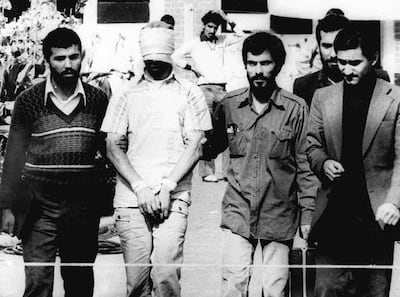Tehran's recent release of two British-Iranian nationals held on fabricated spying charges inevitably raises questions about the motives that lie behind the regime's decision to end their ordeal.
From the early days of the Iranian revolution in 1979, it has resorted to the ancient practice of hostage-taking as a means to achieve its political objectives. The 1979-81 crisis, when the Islamic Revolutionary Guard Corps held 52 American diplomats, comes to mind – as does the kidnapping of more than a hundred foreign nationals in Lebanon, on Tehran's orders, between 1982 and 1992.
The US diplomats were held to put pressure on Washington to stop providing sanctuary to Shah Mohammad Reza Pahlavi, the deposed Iranian ruler who fled into exile after the revolution, while the seizure of foreign nationals in Beirut was aimed at forcing the US and its allies to end their involvement in the Arab country's long-running civil war.
Now, with Wednesday's release of Nazanin Zaghari-Ratcliffe, a 43-year-old aid worker, and Anoosheh Ashoori, a retired engineer, much attention will be focused on the regime's motives for seizing them in the first place, and why it chose this week in particular to grant them their freedom.
The motivation to seize Mrs Zaghari-Ratcliffe in 2016 appears straightforward. Iran had been involved in a long-running dispute with the British government over an arms deal dating back to the Shah's rule in 1971. Years after agreeing to deliver 1,750 Chieftain tanks, London cancelled the contract once the Shah was deposed, but failed to return the advance amount of about £400 million ($524m) in today's money.
From the moment Mrs Zaghari-Ratcliffe was confined to Tehran's notorious Evin prison, where she spent significant periods being held in solitary confinement, her guards had made it clear to her that she was being held over the unpaid debt.
The negotiations that ultimately secured her release were, therefore, primarily focused on the debt repayment, an issue that was complicated by the necessity of the British authorities to not breach the numerous economic sanctions the West has imposed against Tehran. Once London found a way to transfer the funds to Tehran, using a Swiss bank as an intermediary, Mrs Zaghari-Ratcliffe was allowed to fly home to be reunited with her husband Richard and her seven-year-old daughter Gabriella.
Mr Ashoori's detention, by contrast, has always been less clear-cut after he was snatched off the street in Tehran in 2017 during a visit to see his mother. He spent the next five years behind bars after being convicted of spying for Israel. As in the case of Mrs Zaghari-Ratcliffe, the charges were fabricated and Mr Ashoori simply found his name added to the list of dual-national citizens that Iran has often held as pawns in its wider struggle with the West.
The release of both Britons suggests that Iran could also be deliberately trying to foster better relations with the West, as negotiations to revive the 2015 nuclear deal – also known as JCPOA – are reported to be entering a critical phase. Tehran's promise to improve the conditions of Morad Tahbaz, an Iranian American who holds British citizenship, provides another reason to believe that this could be the case.
Tahbaz, a 66-year-old businessman and wildlife conservationist, was arrested during a crackdown on environmental activists in 2018. Authorities accused Tahbaz and seven other conservationists – members of the Persian Wildlife Heritage Foundation – of collecting classified information about Iran's strategic areas under the pretext of carrying out environmental and scientific projects. His Canadian-Iranian colleague, Kavous Seyed-Emami, died a few weeks later in unexplained circumstances.
Iran has just announced it was releasing Tahbaz from prison "on furlough".
There are an estimated dozen or so dual nationals still being held by Tehran, and there is mounting speculation that their fate could be directly linked to the outcome of the nuclear talks taking place in Vienna between Iran on the one side and the five permanent members of the UN Security Council (plus Germany) on the other. On several occasions during these talks, Iranian as well as American officials have indicated that the issue of prisoner release was being discussed on the sidelines.

To judge by the warm pro-Iran sentiments that were expressed in the UK's House of Commons following the release of the two dual nationals this week, Tehran clearly believes such deals are to its benefit. Expectations are certainly rising that negotiations to revive the JCPOA could soon provide a breakthrough, not least because US President Joe Biden remains committed to restoring an agreement that was undermined by his predecessor Donald Trump's decision to withdraw America from it in 2018.
Since then, Iran has responded by resuming work on its uranium enrichment activities – to the extent that western intelligence experts now believe it has sufficient quantities of highly enriched uranium for four nuclear warheads.
With the global security threat posed by Tehran's nuclear programme increasing by the day, western negotiators are keen to finalise a deal quickly. Indications that the negotiations were making progress received a boost from Iranian Foreign Minister Hossein Amirabdollahian earlier this week, when he confirmed that only two issues remained outstanding for is government.
As with the West, Iran, too, is keen to conclude an agreement on its nuclear future, as it will result in lifting punitive economic sanctions. Releasing foreign nationals just as the negotiations are reaching their final stages can be seen as a sign that the regime is keen to strike a deal.
















